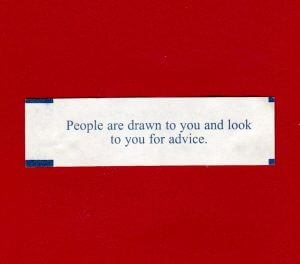Fortune Cookie Friday: Advice on Advice

There are many forms of advice in this world, relationship, medical, financial, etc. We look to others for help when we find ourselves at a crossroad. We need to make a decision, and we don’t know what to do.
When I was in high school, my friends would come to me for advice. I certainly wasn’t an experienced therapist, but they felt comfortable talking to me. I lived a life similar to most teens. I had the stresses of school, family, and love, although not always in that order. Many came to me with issues of love, and we joked that I was a G-rated version of Dr. Ruth.
Most of the time my friends solved their problems by talking them through. I usually just sat there and listened—I’m a good listener, or at least I’ve been told so. There were occasions that a friend wanted to bounce some ideas off me. They said they were looking for advice, but what they really wanted was validation. They already made a decision; they just wanted to make sure it was the right one.
Again, I would listen and let them list the pros and cons of their choice. Sometimes I would encourage them to follow what they knew was true in their hearts and they were grateful for the advice. I don’t think I gave them any astounding advice. I just made them more resolute in their decision. That little confidence boost was all that they needed.
Today’s fortune had me thinking about the kind of people we turn to for advice. We go to doctors when we are sick and want to get better. We ask financial advisers to help us make our money work for us. We seek out spiritual advisers when we question our faith. Yes, we even go to family and friends with matters of the heart. But what makes a good adviser?
When looking for an adviser, we should look for certain qualities.
Knowledgeable
When we need answers, we want someone who knows their stuff. A knowledgeable person can be a beneficial adviser, especially when it comes to complex matters like finances and law. We look for the right person for the right problem.

We don’t seek the advice of a pastry chef when we have trouble with our car. Of course, there may be that rare baker that tinkers in the pit at NASCAR rallies. In that case, ask them about that engine light and pick up a scone at the same time.
Sans grease monkey pastry chefs, we look for people that have experience in the field pertaining to our problem. They have years of study and work to fall back on. With this knowledge, they can help guide us through the uncharted waters.
Trustworthy
Finding someone to help us with making decisions means we may have to give up some personal information. We want to feel confident that they won’t divulge that information to others. If we think we can’t trust the adviser, we may hold back information that is necessary to solve the problem.

Many professionals have disclosure forms that protect our confidentiality, but we won’t find those when looking to a friend for advice on a more personal matter. In these instances, a long history of trustworthiness is all we can go on.
Skilled at Communication
Sometimes it is difficult to explain what our problem is. We have a hard time finding the right words. Someone with excellent communication skills can ask the right questions to get to the matter quickly. They can also precisely advise us on how to proceed.

No one wants an adviser that is vague with their suggestions. Vague answers can only make the decision more difficult. I once asked someone about birthday gift ideas for a close mutual friend of ours. They told me, “think outside the box.” This advice left me scratching my head. I wasn’t sure if they were joking or not. I believe that this person didn’t want to help me, and this was their way of saying it. Either way, I ended up seeking help elsewhere, and my friend liked the gift I chose.
Compassionate
We can feel vulnerable when we ask for advice. It can be daunting to admit that we don’t know something. A compassionate adviser will have the understanding to address our concerns. They will also guide us in a non-judgmental way.

Be aware that not all solutions are easy to hear. Constructive criticism can be harsh as well as helpful. When I send my writing to an editor, I trust them to be honest with me. They could tell me that parts of my work need a complete overhaul. I don’t like the idea of spending hours, if not days, reworking a scene, but if it makes the writing better, then I would take their advice.
When you find yourself with more questions than answers, you can search the Internet for solutions, read books on the problem, or even gain insight from a fortune cookie. There is a wealth of information out there. If those resources don’t work, a good adviser can be helpful.
Finding a good adviser can be challenging and, in some cases, expensive. They can help us realize what we knew to be true, guide us on unfamiliar paths, and warn us of possible mistakes. Advice can be beneficial, but ultimately, it is we that must make the final decision and take that leap of faith.




